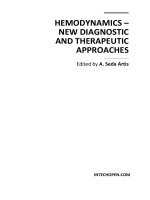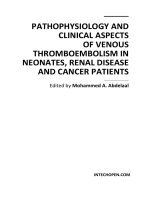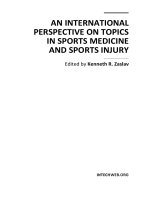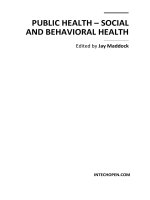WORK AND LIFE INTEGRATION organizational cultural and individual perspectives edited by ellen ernst kossek
Bạn đang xem bản rút gọn của tài liệu. Xem và tải ngay bản đầy đủ của tài liệu tại đây (45.64 MB, 600 trang )
TeA
M
YYeP
G
Digitally signed by
TeAM YYePG
DN: cn=TeAM
YYePG, c=US,
o=TeAM YYePG,
ou=TeAM YYePG,
email=yyepg@msn.
com
Reason: I attest to
the accuracy and
integrity of this
document
Date: 2005.09.30
15:11:54 +08'00'
Work and Life Integration
Organizational, Cultural, and
Individual Perspectives
LEA's ORGANIZATION AND MANAGEMENT SERIES
Series Editors
ARTHUR P. BRIEF, Tulane University
JAMES P. WALSH, University of Michigan
Associate Series Editors
P. CHRISTOPHER eARLEY, Indiana University
SARA L. RYNES, University of Iowa
Ashforth (Au.) • Role Transitions in Organizational Life: An Identity-Based
Perspective
Bartunek (Au.) • Organizational and Educational Change: The Life and Role of a
Change Agent Group
Beach (Ed.) • Image Theory: Theoretical and Empirical Foundations
Brett/Drasgow (Eds.) • The Psychology of Work: Theoretically Based Empirical
Research
Darley/Messick/Tyler (Eds.) • Social Influences on Ethical Behavior in Organizations
Denison (Ed.) • Managing Organizational Change in Transition Economies
Earley/Gibson (Aus.) • Multinational Work Teams: A New Perspective
Garud/Karnoe (Eds.) • Path Dependence and Creation
Jacoby (Au.) • Employing Bureaucracy: Managers, Unions, and the Transformation of
Work in the 20th Century, Revised Edition
Kossek/Lambert (Eds.) • Work and Life Integration: Organizational, Cultural, and
Individual Perspectives
Lant/Shapira (Eds.) • Organizational Cognition: Computation and Interpretation
Lord/Brown (Aus.) • Leadership Processes and Follower Self-Identity
Margolis/Walsh (Aus.) • People and Profits? The Search Between a Company's Social
and Financial Performance
Messick/Kramer (Eds.) • The Psychology of Leadership: Some New Approaches
Pearce (Au.) • Organization and Management in the Embrace of the Government
Peterson/Mannix (Eds.) • Leading and Managing People in the Dynamic Organization
Riggio/Murphy/Pirozzolo (Eds.) • Multiple Intelligences and Leadership
Schneider/Smith (Eds.) • Personality and Organizations
Thompson/Levine/Messick (Eds.) • Shared Cognition in Organizations: The
Management of Knowledge
LEA's SERIES IN APPLIED PSYCHOLOGY
Series Editors
EDWIN A. FLEISHMAN, George Mason University
JEANETTE N. CLEVELAND, Pennsylvania State University
Bedny/Meister • The Russian Theory of Activity: Current Applications to Design and
Learning
Brannick/Salas/Prince • Team Performance Assessment and Measurement: Theory,
Research, and Applications
Cleveland/Stockdale/Murphy • Women and Men in Organizations: Sex and Gender
Issues at Work
Cohen • Multiple Commitments in the Workplace: An Integrative Approach
Cropanzano • Justice in the Workplace: Approaching Fairness in Human Resource
Management, Volume 1
Cropanzano • Justice in the Workplace: From Theory to Practice, Volume 2
Day/Zaccaro/Halpin • Leader Development for Transforming Organizations: Growing
Leaders for Tomorrow
Driskell/Salas • Stress and Human Performance
Fine/Cronshaw • Functional Job Analysis: A Foundation for Human Resources
Management
Fine/Getkate • Benchmark Task for Job Analysis: A Guide for Functional Job Analysis
(FJA) Scales
Ford/Kozlowski/Kraiger/Salas/Teachout • Improving Training Effectiveness in Work
Organizations
Greenberg • Organizational Behavior: The State of the Science, Second Edition
Kleinbeck/Quast/Thierry/Hacker • Work Motivation
Kossek/Lambert • Work and Life Integration: Organizational, Cultural, and Individual
Perspectives
Kurke/Scrivner • Police Psychology into the 21st Century
Lefkowitz • Ethics and Values in Industrial and Organizational Psychology
London • Job Feedback: Giving, Seeking, and Using Feedback for Performance
Improvement, Second Edition
London • How People Evaluate Others in Organizations
Morrison/Adams • Contemporary Career Development Issues
Mumford/Stokes/Owens • Patterns of Life History: The Ecology of Human Individuality
Murphy • Validity Generalization: A Critical Review
Murphy/Saal • Psychology in Organizations: Integrating Science and Practice
Murphy/Riggio • The Future of Leadership Development
Prien/Schippmann/Prien • Individual Assessment: As Practiced in Industry and
Consulting
Rosen • Teamwork and the Bottom Line: Groups Make a Difference
Schuler/Farr/Smith • Personnel Selection and Assessment: Individual and
Organizational Perspectives
Senders/Moray • Human Error: Cause, Prediction, and Reduction
Smith • Organizational Surveys: The Diagnosis and Betterment of Organizations
Through Their Members
Thornton Ill/Mueller-Hanson • Developing Organizational Simulations: A Guide for
Practitioners and Students
Vardi/Weitz • Misbehavior in Organizations: Theory, Research and Management
This page intentionally left blank
WORK AND
LIFE INTEGRATION
Organizational, Cultural, and
Individual Perspectives
Edited by
Ellen Ernst Kossek
Michigan State University
Susan J. Lambert
The University of Chicago
LAWRENCE ERLBAUM ASSOCIATES, PUBLISHERS
2005 Mahwah, New Jersey
London
Senior Acquisitions Editor:
Editorial Assistant:
Cover Design:
Textbook Production Manager:
Full-Service Compositor:
Text and Cover Printer:
Anne Duffy
Kristin Duch
Sean Trane Sciarrone
Paul Smolenski
Westchester Book Services
Sheridan Books, Inc.
This book was typset in 10/12 pt. Times, Italic, Bold and Bold Italic.
The heads are typeset in Americana, Americana Italic, Americana Bold,
and Americana, Bold Italic.
Copyright © 2005 by Lawrence Erlbaum Associates, Inc.
All rights reserved. No part of this book may be reproduced
in any form, by photostat, microform, retrieval system, or any
other means, without prior written permission of the publisher.
Lawrence Erlbaum Associates, Inc., Publishers
10 Industrial Avenue
Mahwah, New Jersey 07430
www.erlbaum.com
Library of Congress Cataloging-in-Publication Data
Work and life integration : organizational, cultural, and individual perspectives/
edited by Ellen Ernst Kossek, Susan J. Lambert; foreword by Linda K. Stroh.
p. cm.—(LEA's organization and management series) (Series in applied
psychology)
Papers from a conference.
Includes bibliographical references and indexes.
ISBN 0-8058-4615-8 (alk. paper) — ISBN 0-8058-4616-6 (pbk. : alk. paper)
1. Work and family—Congresses. 2. Organizational change—Congresses.
3. Family policy—Congresses. I. Kossek, Ellen Ernst. II. Lambert, Susan J.
III. Series. IV. Series: Series in applied psychology
HD4904.25.W663
306.3'6—dc22
2005
2004057709
Books published by Lawrence Erlbaum Associates are printed on acid-free paper, and
their bindings are chosen for strength and durability.
Printed in the United States of America
10 9 8 7 6 5 4 3 2 1
To my family, who are my blessings: my wonderful husband, Sandy; my
awe-inspiring children, Andrew, Sarah, Haley, and Dylan; and my parents
Ann and Dan, who raised me with love.
—Ellen Ernst Kossek
East Lansing, Michigan
To my husband, Lee, and my daughter, Eleanor, who make sure I have
ample opportunity to experience personally the challenges of balancing
work and family.
—Susan J. Lambert
Chicago, Illinois
We also dedicate this book to Susan C. Eaton, who was on the faculty of
the Kennedy School of Government at Harvard University and who died
at the end of 2003. Her scholarship exemplifies research that contributes
to both theory and practice on work-life issues.
This page intentionally left blank
Contents
Series Foreword
xiii
Series Foreword
xv
Foreword
xvii
Acknowledgments
xix
About the Contributors
xxi
I: INTRODUCTORY CHAPTERS
1
1
"Work-Family Scholarship": Voice and Context
Ellen Ernst Kossek and Susan J. Lambert
3
2
(Re)Considering Conflict Between Work and Family
Shelley M. MacDermid
19
ORGANIZATIONAL PERSPECTIVES
41
The Changing Time Demands of Managerial and Professional
Work: Implications for Managing the Work-Life Boundary
Frances J. Milliken and Linda M. Dunn-Jensen
43
II:
3
4 Technology, Organizations, and Work-Life Integration
P. Monique Valcour and Larry W. Hunter
61
5
85
Organizational Reliability, Flexibility, and Security
Karlene H. Roberts, Vinit M. Desai, and Peter Madsen
IX
CONTENTS
X
6
Organizational Stratification: Distributing Opportunities for
Balancing Work and Personal Life
Susan J. Lambert and Elaine Waxman
103
7
When Firms Restructure: Understanding Work-Life Outcomes
Philip Moss, Harold Salzman, and Chris Tilly
8
Family-Friendly Programs and Work-Life Integration: More
Myth Than Magic?
Kyra L. Sutton and Raymond A. Noe
151
The Equity Imperative: Redesigning Work for
Work-Family Integration
Joyce K. Fletcher and Lotte Bailyn
171
INDIVIDUAL PERSPECTIVES
191
9
III:
10 The Importance of the Individual: How Self-Evaluations Influence
the Work-Family Interface
Alyssa Friede and Ann Marie Ryan
11 Work and Family Stress and Well-Being: An Integrative
Model of Person-Environment Fit Within and Between the Work
and Family Domains
Jeffrey R. Edwards and Nancy P. Rothbard
12 Flexibility Enactment Theory: Implications of Flexibility
Type, Control, and Boundary Management for WorkFamily Effectiveness
Ellen Ernst Kossek, Brenda A. Lautsch, and Susan C. Eaton
13 The Decision Process Theory of Work and Family
Steven A. Y. Poelmans
14 Professionals Becoming Parents: Socialization, Adaptation, and
Identity Transformation
Mary Dean Lee, Shelley M. MacDermid, Pamela Lirio Dohring,
and Ellen Ernst Kossek
15 What Is Success? Who Defines It? Perspectives on the Criterion
Problem as It Relates to Work and Family
Jeanette N. Cleveland
IV:
CULTURAL AND SOCIAL PERSPECTIVES
16 Work-Life Integration and Social Policy: A Social Justice Theory
and Gender Equity Approach to Work and Family
Suzan Lewis and Linda Haas
127
193
211
243
263
287
319
347
349
CONTENTS
17 Three Reasons for a Transnational Approach to WorkLife Policy
Winifred R. Poster
18 The Role of Speaking Up in Work-Life Balancing
Amy C. Edmondson and James R. Detert
19 The Development of Psychosocial Capital in Organizations:
Implications for Work and Family Life
Sabir I. Giga and Gary L. Cooper
20
21
V:
XI
375
401
429
Supervisor Support and Work-Life Integration: A Social
Identity Perspective
Karen Hopkins
445
Recasting the Work-Family Agenda as a Corporate
Social Responsibility
Marcie Pitt-Catsouphes and Bradley Googins
469
SUMMARY CHAPTERS: FUTURE DIRECTIONS
491
22 Connecting Theory and Practice
Marian N. Ruderman
23 Future Frontiers: Enduring Challenges and Established
Assumptions in in the Work-Life Field
Susan J. Lambert and Ellen Ernst Kossek
493
513
Author Index
533
Subject Index
551
This page intentionally left blank
Series Foreword
Arthur P. Brief
James P. Walsh
Tulane University
University of Michigan
To many, Rosebeth Moss Kanter's 1977 monograph Work and Family in the
United States set the agenda for the study of the interplay between our family
and work lives. One could view Ellen Ernst Kossek and Susan J. Lambert's
provocative collection of chapters as a report card on how much we have learned
in the last 25 years and as a statement of what our research agenda ought to be
in the next quarter century. Particularly impressive is the degree to which the
collection blurs traditional disciplinary boundaries among sociology, psychol
ogy, and economics, offering a rich account of family-work scholarship. Equally
praiseworthy is that the contributors to the volume have not shied away from
asserting the policy implications of their findings. Thus the book not only should
enlighten our research community, but it also, appropriately so, should inform
public debates on how workplaces can be made more family sensitive. We are
very pleased to have Kossek and Lambert join our series.
XIII
This page intentionally left blank
Series Foreword
Jeanette N. Cleveland
Pennsylvania State
Edwin A. Fleishman
George Mason University
University
We are excited that the book Work and Life Integration: Organizational, Cul
tural, and Individual perspectives, edited by Ellen Ernst Kossek and Susan Lam
bert, appears in both LEA's Series in Applied Psychology and the Organization
and Management Series. It is one of the first books to be celebrated in both
series and it is very aptly placed. Family and work continue to be two important
domains of our lives, and the interactions of them are critically important to
both psychologists and managers. Research in this area increasingly is multi
disciplinary, addressing the needs and health of workers, families, and their
organizations. The chapters in Kossek and Lambert examine work and family
from a diversity of fields, including psychology, sociology, and economics, as
well as from multiple levels of focus (individual, family, organizational, and
government policy). The contributors to the volume illustrate that we have come
a long way from viewing work and family issues as a woman's problem or as
an individual employee issue. Rather, these contributors identify public policy
implications of the research they describe and show how organizations can be
pivotal partners with employees, families, the community, and government agen
cies in fostering the positive integration of work and life.
XV
This page intentionally left blank
Foreword
Linda K. Stroh
Loyola University
Work-family researchers have had much success in encouraging both organi
zations and individuals to recognize the importance of achieving greater balance
in our lives. We now understand how the imbalance is detrimental to the orga
nization in terms of effectiveness and efficiency and to the individual in terms
of stress, quality of life, and also our own personal effectiveness and efficiency.
While we now better understand the problems surrounding work-life integration,
we are far from providing the necessary solutions to create a sense of work-life
equilibrium.
At the heart of the work-life problem is the increasing complexity of our
modern lives. In many ways, we have unlimited work, family, and life oppor
tunities. While these opportunities have created more choices, they have also
created greater uncertainty. At the onset of the industrial revolution families were
primarily male-headed households. With that predominant family form, struc
turing our lives and our organizations to accommodate the family form was, in
comparison, reasonably simple. Fortunately, society has evolved far from that
anachronistic notion of just one family form and the worker's role within this
structure. Unfortunately, this progress and consequent variation in family forms
and organizational structures have brought with them a plethora of options and
decisions and have increased greatly the uncertainty in our lives.
Interestingly, the recent technological advances that have resulted in enor
mous industrial progress could have led to organizational structures that allowed
greater balance, given the intrinsic flexible nature of technology. Yet, much of
the current research suggests that our new technological/information society has
created more, not less, complexity and, yes, even more uncertainty in our lives.
XV11
xviii
FOREWORD
My desire to work in academia began with an interest in helping organizations
and families find better ways to relocate employees and their families throughout
the United States and the world. Through my own life experiences, I knew there
had to be a way to help families deal with this major stress in their lives. I have
seen firsthand the challenges families encounter as they attempt to build careers,
build their families, and create an equilibrium in their lives between what they
want for their families and what they want for their careers and the workplace;
it is very evident that these two "wants" are often in conflict. Now, decades
later, while the challenges and barriers that continue to have an impact on all
of our lives may take different forms, it does not take a systematic research
study to realize that most members of industrialized economies are still strug
gling with how to achieve a work-life balance while excelling in the workplace
and devoting maximum attention to their families.
This volume addresses the intersect between work, life, and family in new
and interesting ways, and it should convince even those steeped in work-life
integration research of the importance of this volume to this field. It is clearly
a must-read for both practitioners and academics interested in seeking ways to
create meaningful lives. The volume addresses current-day challenges of dealing
with work-life integration issues and sets the stage for future research agendas.
Acknowledgments
Writing and editing a book is a major multiyear endeavor that requires substan
tial resources, such as time to do the work and be creative, financing, and ad
ministrative support. The editors are grateful to Michigan State University and
the University of Chicago for the resources provided to support our work on
this volume. At Michigan State, Hiram Fitzgerald, the Assistant Provost for
Outreach and Engagement; Jan Bokemeier and Cheryl Booth of Families and
Communities Together Coalition; Richard Block, recipient of the School of La
bor and Industrial Relations (SLIR) Alcoa grant; and SLIR's graduate assis
tantship program are all thanked for financial support of this book. Deb Bittner,
Terry Curry, Becky Scott, and Helena Stovall also of SLIR are thanked for
administrative support. At Chicago, the School of Social Service Administration
is thanked for financial support and Elaine Waxman is thanked for her detailed
note taking at the authors' conference.
We are also grateful to Marian Ruderman and the Center for Creative Lead
ership (CCL) for allowing us to hold a conference of contributing authors and
a small cadre of leading work-life practitioners in Greensboro, North Carolina,
in May 2003. CCL is designed to foster leadership development and organiza
tional management skills for practicing managers and is also a research insti
tution and publisher. Academics do not frequently get the opportunity to develop
their thoughts and research in such a wonderful setting. We are appreciative of
Marian's championing of CCL's collaboration on the conference and also of the
support provided by her colleagues, John Alexander, Barbara Demarest, Marty
Wilcox, Tracy Dobbins, Joan Gurvis, Gordon Patterson, and Patricia Ohlott,
among many others. Bringing the contributors together midway through the
xix
XX
ACKNOWLEDGMENTS
writing process was extremely valuable in allowing the authors to get feedback
on chapter development and content, and it fostered the culmination of what we
believe is a tighter volume of higher quality.
We also thank our corporate sponsors of the conference and the volume:
Candice Lange, Eli Lilly; Joan Glubczynski, S. C. Johnson; Sherise Lindsay,
Dana Pulley, and Dena Papazoglou, Booz Allen Hamilton; and Kristen Camilli
and Tim Reynolds, Whirlpool. We thank our LEA editor, Anne Duffy, for being
so supportive, encouraging, and flexible, and Kristin Duch for timely publishing
support.
About the Contributors
THE EDITORS
Ellen Ernst Kossek (Ph.D., Yale) is Professor at Michigan State University's
School of Labor and Industrial Relations. She is on the National Academy of
Management's Board of Governors and was chair of the Gender and Diversity
in Organizations Division. She is a fellow of the American Psychological As
sociation and the Society of Industrial Organizational Psychology. She serves
on four editorial boards and has written four other books and over 30 articles
in leading journals, including Academy of Management Journal, Journal of Ap
plied Psychology, Human Relations, and Personnel Psychology. Several of her
articles have been nominated for or have won Best Paper awards. Her current
research examines new ways of working flexibly (e.g., reduced work load, te
lework) and linkages to organizational change and human resource strategies.
Susan J. Lambert is Associate Professor in the School of Social Service
Administration and Co-Director of The Project on the Public Economy of Work
at the University of Chicago. She received her doctorate from the University of
Michigan in social work and organizational psychology. Lambert's research fo
cuses on the "work side" of work-life issues. She conducts workplace-based
research that examines the relationship between employer practices and policies
and worker performance and well-being. Lambert's articles appear in leading
journals such as Academy of Management Journal, Annals of the American
Academy of Political and Social Sciences, Human Relations, and Social Service
Review.
XXI
XXII
ABOUT THE CONTRIBUTORS
THE AUTHORS
Lotte Bailyn is the T. Wilson (1953) Professor of Management at MIT's
Sloan School of Management and Co-Director of the MIT Workplace Center.
In her book Breaking the Mold: Women, Men, and Time in the New Corporate
World (1993), she argues that by challenging the assumptions in which current
work practices are embedded, it is possible to meet the goals of both business
productivity and employees' family and community concerns, and to do so in
ways that are equitable for men and women. Bailyn's subsequent work in cor
porate organizations supports that basic proposition, and it is detailed in Beyond
Work-Family Balance: Advancing Gender Equity and Workplace Performance,
of which Bailyn is a co-author.
Jeanette N. Cleveland is Professor of Psychology at Pennsylvania State Uni
versity. Her research interests include personal and contextual variables in per
formance appraisal, workforce diversity issues, sexual harassment, and work and
family. She was consulting editor for Journal of Organizational Behavior and
has served or is currently serving on the editorial boards of Journal of Applied
Psychology, Academy of Management Journal, Journal of Vocational Behavior,
Human Resource Management Review, Journal of Organizational Behavior,
Journal of Applied Psychology, and International Journal of Management Re
views.
Cary L. Cooper, CBE, is Professor of Organizational Psychology and Health
at Lancaster University Management School, Lancaster University, England. He
is president of the British Academy of Management, founding editor of Journal
of Organizational Behavior, and was made a Commander of the Excellent Order
of the British Empire by Queen Elizabeth in June 2001 for his services to
organizational health.
Vinit M. Desai is a doctoral student and researcher in organizational behavior
and industrial relations at the Walter A. Haas School of Business, University of
California at Berkeley. His research interests include organizational learning and
the study of organizations in which error can have catastrophic consequences.
He has worked in the private and public sectors.
James R. Detert is Assistant Professor of Management and Organization in
Pennsylvania State University's Smeal College of Business. He has a Ph.D. in
organizational behavior from Harvard University. His dissertation research ex
plored the effects of leadership and formal and informal control mechanisms on
employee decisions about the safety and utility of speaking up. His previous
research and publications also explore leadership, cultural, and institutional in
fluences on learning and improvement in organizations.
Pamela Lirio Dohring is a doctoral student in the Faculty of Management
at McGill University. Her research interests include young women's career and
family practices, cross-cultural management, and work-family issues. She has
recently given presentations at the Administrative Sciences Association of Can
ABOUT THE CONTRIBUTORS
XXIII
ada, the Academy of International Business, and the Gender, Work and Society
conference.
Linda M. Dunn-Jensen is a doctoral candidate in the Management Depart
ment at New York University. Her current research on time explores the moti
vation of time allocation between work and non-work life, specifically concen
trating on the motivation to be visible at work. Another area of her research
interest focuses on the effect of time compression on work-family balance.
Susan C. Eaton was an assistant professor at the Kennedy School of Gov
ernment at Harvard University. Dr. Eaton held a doctorate from MIT. She was
a innovative scholar whose work often bridged research and practice and
spanned the fields of labor relations, health care, social policy, and work-family.
She died on December 30, 2003. Her insights, wisdom, and presence will be
missed.
Jeffrey R. Edwards (Ph.D, Carnegie Mellon University) is the Belk Distin
guished Professor of Management at the Kenan-Flagler Business School, Uni
versity of North Carolina. His research examines stress, coping, and well-being,
person-organization fit, work and family, and research methods. His research has
appeared in the Academy of Management Review, Academy of Management
Journal, Journal of Applied Psychology, Personnel Psychology, Psychological
Methods, and Organizational Behavior and Human Decision Processes
(OBHDP}. He is editor of OBHDP and has served as associate editor and board
member of other major journals. He is past chair of the Research Methods
Division of the Academy of Management, fellow of the American Psychological
Association and the Society of Industrial and Organizational Psychology, and
has been elected to the Society of Organizational Behavior.
Amy C. Edmondson is Professor of Business Administration at Harvard Uni
versity. Her research investigates learning processes in teams and organizations.
Recent publications include "The Local and Variegated Nature of Learning in
Organizations" (Organization Science, 2002), and "Disrupted Routines: Team
Learning and New Technology Implementation," with Gary Pisano and Richard
Bohmer (Administrative Science Quarterly, 2001). Edmondson received her doc
torate in organizational behavior from Harvard University.
Joyce K. Fletcher is Professor of Management at the Simmons School of
Management in Boston and a senior research scholar at the Jean Baker Miller
Training Institute at the Wellesley College Centers for Women. She is the co
author of a widely read Harvard Business Review article entitled "A Modest
Manifesto for Shattering the Glass Ceiling," and is a frequent speaker on the
topic of women, power, and leadership. She is author of Disappearing Acts:
Gender, Power and Relational Practice at Work and co-author of a book on
leading change entitled Beyond Work Family Balance: Advancing Gender Equity
and Workplace Performance.
Alyssa Friede is a doctoral student at Michigan State University. She com
pleted her undergraduate degree in psychology at the University of Pennsylvania.









